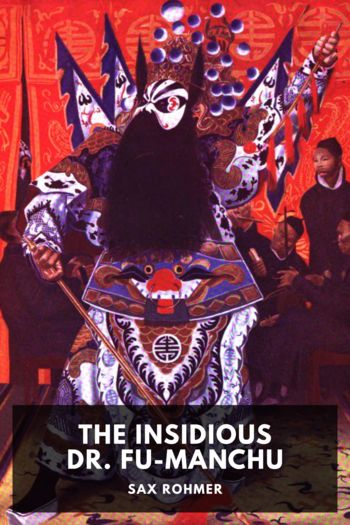The Insidious Dr. Fu-Manchu - Sax Rohmer (best finance books of all time .TXT) 📗

- Author: Sax Rohmer
Book online «The Insidious Dr. Fu-Manchu - Sax Rohmer (best finance books of all time .TXT) 📗». Author Sax Rohmer
And she would droop her lashes over her dark eyes.
The dacoits whom the Chinaman had brought to England originally numbered seven, we learned. As you, having followed me thus far, will be aware, we had thinned the ranks of the Burmans. Probably only one now remained in England. They had lived in a camp in the grounds of the house near Windsor (which, as we had learned at the time of its destruction, the Doctor had bought outright). The Thames had been his highway.
Other members of the group had occupied quarters in various parts of the East End, where sailormen of all nationalities congregate. Shen-Yan’s had been the East End headquarters. He had employed the hulk from the time of his arrival, as a laboratory for a certain class of experiments undesirable in proximity to a place of residence.
Nayland Smith asked the girl on one occasion if the Chinaman had had a private seagoing vessel, and she replied in the affirmative. She had never been on board, however, had never even set eyes upon it, and could give us no information respecting its character. It had sailed for China.
“You are sure,” asked Smith keenly, “that it has actually left?”
“I understood so, and that we were to follow by another route.”
“It would have been difficult for Fu-Manchu to travel by a passenger boat?”
“I cannot say what were his plans.”
In a state of singular uncertainty, then, readily to be understood, we passed the days following the tragedy which had deprived us of our fellow-worker.
Vividly I recall the scene at poor Weymouth’s home, on the day that we visited it. I then made the acquaintance of the Inspector’s brother. Nayland Smith gave him a detailed account of the last scene.
“Out there in the mist,” he concluded wearily, “it all seemed very unreal.”
“I wish to God it had been!”
“Amen to that, Mr. Weymouth. But your brother made a gallant finish. If ridding the world of Fu-Manchu were the only good deed to his credit, his life had been well spent.”
James Weymouth smoked awhile in thoughtful silence. Though but four and a half miles S. S. E. of St. Paul’s the quaint little cottage, with its rustic garden, shadowed by the tall trees which had so lined the village street before motor buses were, was a spot as peaceful and secluded as any in broad England. But another shadow lay upon it today—chilling, fearful. An incarnate evil had come out of the dim East and in its dying malevolence had touched this home.
“There are two things I don’t understand about it, sir,” continued Weymouth. “What was the meaning of the horrible laughter which the river police heard in the fog? And where are the bodies?”
Karamanèh, seated beside me, shuddered at the words. Smith, whose restless spirit granted him little repose, paused in his aimless wanderings about the room and looked at her.
In these latter days of his Augean labors to purge England of the unclean thing which had fastened upon her, my friend was more lean and nervous-looking than I had ever known him. His long residence in Burma had rendered him spare and had burned his naturally dark skin to a coppery hue; but now his gray eyes had grown feverishly bright and his face so lean as at times to appear positively emaciated. But I knew that he was as fit as ever.
“This lady may be able to answer your first question,” he said. “She and her brother were for some time in the household of Dr. Fu-Manchu. In fact, Mr. Weymouth, Karamanèh, as her name implies, was a slave.”
Weymouth glanced at the beautiful, troubled face with scarcely veiled distrust. “You don’t look as though you had come from China, miss,” he said, with a sort of unwilling admiration.
“I do not come from China,” replied Karamanèh. “My father was a pure Bedawee. But my history does not matter.” (At times there was something imperious in her manner; and to this her musical accent added force.) “When your brave brother, Inspector Weymouth, and Dr. Fu-Manchu, were swallowed up by the river, Fu-Manchu held a poisoned needle in his hand. The laughter meant that the needle had done its work. Your brother had become mad!”
Weymouth turned aside to hide his emotion. “What was on the needle?” he asked huskily.
“It was something which he prepared from the venom of a kind of swamp adder,” she answered. “It produces madness, but not always death.”
“He would have had a poor chance,” said Smith, “even had he been in complete possession of his senses. At the time of the encounter we must have been some considerable distance from shore, and the fog was impenetrable.”
“But how do you account for the fact that neither of the bodies have been recovered?”
“Ryman of the river police tells me that persons lost at that point are not always recovered—or not until a considerable time later.”
There was a faint sound from the room above. The news of that tragic happening out in the mist upon the Thames had prostrated poor Mrs. Weymouth.
“She hasn’t been told half the truth,” said her brother-in-law. “She doesn’t know about—the poisoned needle. What kind of fiend was this Dr. Fu-Manchu?” He burst out into a sudden blaze of furious resentment. “John never told me much, and you have let mighty little leak into the papers. What was he? Who was he?”
Half he addressed the words to Smith, half to Karamanèh.
“Dr. Fu-Manchu,” replied the former, “was the ultimate expression of Chinese cunning; a phenomenon such as occurs but once in many generations. He was a superman of incredible genius, who, had he willed, could have revolutionized science. There is a superstition in some parts of China according to which, under certain peculiar conditions (one of which is proximity to a deserted burial-ground) an evil spirit of incredible age may enter unto the body of a newborn infant. All my efforts thus far have not availed me to trace the genealogy of the man called Dr. Fu-Manchu. Even Karamanèh





Comments (0)